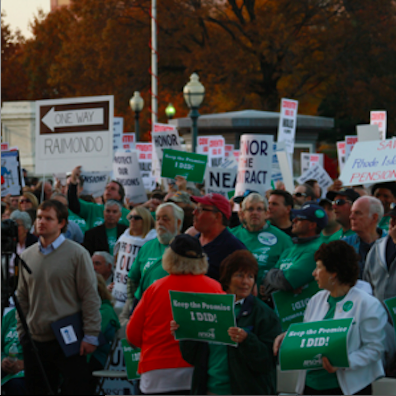Jencunas: Obama’s State of the Union Victory Lap - and Wish List
Wednesday, January 21, 2015
The Democratic Party may have been dealt a resounding defeat in November’s midterm elections, but nobody would have known that listening to President Obama’s State of the Union address.
The speech was one part political victory lap and one part policy wish list, part of a larger plan by the White House to remain relevant on public policy and position the Democratic candidate for victory in 2016.
The first goal, relevance on public policy, is unachievable even if Obama gave a speech that made Franklin Roosevelt sound like Jimmy Carter. With two years to go in his Presidency and his party in the minority in Congress, Obama is a lame duck.
GET THE LATEST BREAKING NEWS HERE -- SIGN UP FOR GOLOCAL FREE DAILY EBLASTRather than accept bad deals and compromises with the White House, Republicans will rather wait and hope for victory in 2016. If they win, they’ll get more of what they want in policy. If a Democrat wins, then Republicans might compromise, but there’s no reason to do so now.
The only victories Obama will get with Congress are on areas where he agrees with Republicans. The two most likely areas for this are new free trade agreements, where most Democrats actually oppose Obama, and criminal justice reform, where there is an emerging bipartisan consensus that too many people are in jail.
The most unrealistic part of Obama’s speech was bragging about foreign policy. Terrorist groups are becoming more powerful, Iran continues towards nuclear capability, and the military is preparing to evacuate Middle Eastern embassies. This is only foreign policy victory if the bar for success is set so low that simply avoiding another 9/11 is an achievement.
Another baffling segment was Obama’s alarmism about climate change, which he contradicted with his policy proposals. If Obama really wanted to take action against climate change he would be trying to fund his new social programs through a tax on carbon, not a tax on investment and inheritance. Politically though, empty rhetoric makes sense on climate change, which is an issue of great importance to many Democratic donors but regularly ranks near the bottom of voters’ priorities in public opinion polling.
Rhetorically, the speech was predictable but well-written. Obama focused on the rebounding economy, unsurprising since the combination of falling unemployment and low gas prices have led to Obama’s surging job approval numbers. He took credit about the falling deficit, while conveniently forgetting that his administration fought the budget cuts that helped achieve our rosy fiscal picture.
This victory lap will be the first part of the Democratic political narrative – the economy is improving and the deficit is down. This is a good message for Democrats, though hardly an electoral silver bullet since polling shows most Americans still suffer from stagnant wages and think the country is on the wrong track.
Bragging about Obama’s achievements won’t be enough for a Democrat to win in 2016. After all, Al Gore lost to George W. Bush in 2000 despite enjoying a much stronger economy than there is today. Democrats need a message beyond celebration, which is why Obama trumpeted three new policies: free community college; higher taxes on banks, inheritance, and investment; and tax credits for low-income workers and parents.
He believes these can form the core of a Democratic agenda that makes the Republicans look like the party of the rich while the Democrats look like the party fighting for regular Americans.
Faced with Obama’s seemingly sound political logic, how should Republicans react? By accepting the most popular parts of Obama’s agenda and countering his plan for wealth redistribution with a plan for income growth.
American voters don’t like wealth redistribution. Even faced with stagnating wages and income inequality, voters will prefer a program that increases incomes rather than redistributes them once the money has been earned. Republicans need to develop a clear plan for raising incomes that their candidate can use in 2016. This column isn’t about public policy but the campaign phrases are simple – Obama wants to tax investment and small businesses to redistribute wealth; Republicans want to help working families grow their incomes.
If the Democrats embrace the message Obama laid out in the State of the Union, they will be identified with an agenda that American voters have never supported. Obama talked about turning the page in his speech, but his message is one that American voters will be happy to turn the page on in the 2016 elections.
Brian Jencunas works as a communications and media consultant. During the 2014 Providence mayoral election, he worked with the Cianci campaign, focusing on messaging and polling analysis.
Related Slideshow: 10 Questions Raimondo Has to Answer as Governor
Related Articles
- Rob Horowitz: Obama and Warren: Making Strides on Student Loans
- President Obama’s Remarks at 70th Anniversary of D-Day
- Obama Coming to Newport—Questions for POTUS from the Community
- Obama Coming to Newport: Questions for the President from Community Leaders
- Smart Benefits: Obamacare Exchanges: Enrollment Expectations
- Rob Horowitz: Obama Takes Major Step Forward on Climate
- New: Michelle Obama Visits Rhode Island
- Smart Benefits: Obamacare Extends Sign-Up for Exchanges… Again
- Horowitz: Obamacare - Here to Stay and on the Right Track
- Obamacare Implications of Medical Marijuana in Rhode Island
- The Scoop: Michelle Obama’s Raimondo Video Message, Gorbea’s New Ad, and More
- Obama Reschedules Rhode Island Visit
- Obama Pardons National Turkeys
- Rob Horowitz: Obama’s Immigration Executive Order; Good Policy and Good Politics
- Horowitz: Obama Takes a Big Step Forward on Cuba
- Smart Benefits: Obamacare vs RI Exchange- Which Enrollment Approach Worked Best?
- CVS CEO Larry Merlo To Attend State of the Union as Michelle Obama’s Guest
- President Obama’s Speech on Immigration
- Horowitz: Obama and Jinping Forge Big Climate Change Breakthrough
- 10 Highlights of Obama’s Trip to RI
- The Scoop: Obama, Raimondo Dine at Gregg’s, Fung Calls Out Raimondo on Ethical Standards and More
- Finneran: President Obama—-Black and Blue and Badly Bruised
























